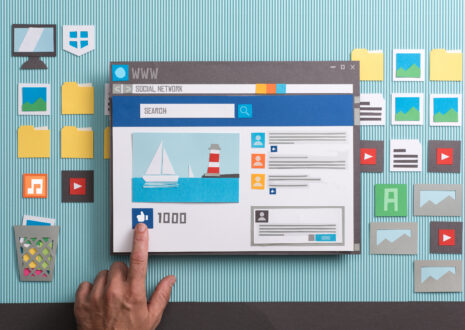Marketing is crucial to the success of a business and its ability to survive a downturn. Brands that come out of recession aren’t cutting their marketing consulting budgets. With the right marketing strategy, brands can give customers a sense of confidence and stability when using their products and services.
Discover the tips below to secure sales and leads with a successful business strategy during this period.
1. Restructure marketing budget
Anticipating a recession this year is a big challenge for businesses in the face of uncertainty. Businesses are presented with two options to manage their marketing campaigns in a downturn: Cutting or restructuring marketing budgets.
In times of crisis, other costs take precedence, pushing marketing investments down the line. Paying employees, running operations, adopting new technology systems and maintaining important contracts are seen as more pressing needs for the survival of the business. In addition, companies are concerned that promotions and advertising during this time period could offend customers who currently tend to be more in control of their spending.
Contrary to popular belief, research by McGraw-Hill found that B2B organizations that maintained or increased their marketing budgets during the 1981-1982 recession had significantly higher sales during and the following three years of recession.
When you are determined to maintain and optimize your marketing strategy during a recession, it ensures long-term sustainable development for your business. The key is to know how to gather and allocate your marketing budget effectively. Fortunately, the Government of Canada offers a number of grants for small businesses to have a digital marketing plan crafted and executed. Since there are almost 5 billion Internet users online, it’s crucial to tap into the digital world and consider inbound marketing to strategically approach and communicate with your audience without bombarding them with marketing and promotional campaigns and content.
2. Content marketing
Economic recession leads to changes in consumer behavior, choices and purchasing preferences. That requires businesses to come up with a new marketing message that is appropriate during this time. This doesn’t mean you have to change the vision and mission of your business. It’s about finding a more relevant alternative by producing content that resonates with your audience. Content marketing can be a means to help you reach your target customers at a much lower cost than paid advertising.
Make sure the content you produce reflects recent market trends and resonates with customers to help them figure out how your brand is helping them solve problems in times of crisis.
- Create content for every stage of your customer funnel to engage potential users and encourage them to buy from you.
- Use positive language and maintain an empathetic tone in your content, keeping in mind the sensitive moods of your customers during a downturn.
- Reusing old content works best to drive traffic to your website and double your chances of generating more leads.
Content marketing supports multiple types of marketing costs less and generates more leads than traditional marketing. Even if you don’t see immediate results, rest assured that your content strategy will ultimately lead to more conversions. Until then, continue to create content to educate your customers and highlight your brand across digital channels.
3. SEO
Over 70% of B2B customers start their product research on the Google search engine. How does this affect your SEO strategy during a downturn?
As customer needs and behaviors change, you can do keyword research and monitor search trends to understand the search terms customers use to find products, services, or answers. for their problem on Google. This way, tailor your content to your customers’ needs, drive more interactions, and ultimately convince them to spend more on your brand.
You can also test your content pieces and optimize with SEO keywords to make them relevant to the current customer and market scenario. These combined efforts will help improve the online rankings of your content and get them in the hands of readers who want the most relevant answers to their Google search queries.
When your competitors are busy debating whether or not to improve SEO you can gain an edge with SEO Web Design by improving website speed, crawlability, link building, indexing, and more.
Like content marketing, SEO takes time to show results, and you can’t immediately link its metrics to your business revenue. On the plus side, both of these marketing activities cost less than paid advertising while helping to build brand awareness in the long run. In other words, make sure your SEO strategy is still working properly as its effects will outlast a recession when the economy fully recovers.
4. Personalized marketing
Personalized marketing is the practice of companies providing personalized content to recipients through data collection and analysis and the use of automation technology.
The purpose of personalized marketing is to help businesses truly connect with their customers and target customers, through one-on-one communication with each individual.
- Improve customer experience: A personalized campaign will do wonders to improve your customer experience. In the midst of a flood of advertising information on the market, a personalized message that meets your needs will stand out, bringing a sense of satisfaction to your customers.
- Increase revenue: Personalizing customer experience is the key to helping businesses increase investment efficiency and increase return on investment (ROI). According to statistics, businesses that have adopted a personalization strategy have 19% more sales on average than businesses that do not.
- Build customer relationships: Personal marketing can easily turn your customers from unfamiliar to familiar. According to statistics, they attract 40% of users into loyal customers. In addition, it is worth noting that up to 80% of shoppers only buy from brands with good personalized marketing. This will be a very effective way to help build your brand.
Consumers, especially those from the Gen Z and Millennials generation, always want businesses to be able to customize the shopping experience to their own preferences. When you successfully personalize your marketing campaigns, you not only help satisfy your customers, increase brand loyalty, but you can also improve the bottom line for the company.
5. Brand loyalty is more impactful than ever
Loyalty marketing strategies include different types of customer engagement, typically including customer surveys and rewards programs. Customer engagement is the process of interacting with customers to understand their needs and help them solve problems. This can include communicating with customers via social media, responding to comments and questions on social media, and sending targeted emails.
Customers who are loyal to your brand are less likely to abandon you in favor of a competitor’s products, especially during economic uncertainty. Developing customer loyalty can help protect your company from losing profit in the event of a decrease in sales.
Beyond reaching for their wallet, loyal customers can boost your business in other ways, one of which being brand advocacy. Brand advocacy is a term used to describe actions taken by people who love your brand and continuously support your organization by promoting products and services to new customers and prospects.
Customer Lifetime Value remains high as acquiring a new customer can cost five times more than retaining an existing customer. And existing customers spend on average 67% more than first-time customers. A focus on the importance of customer loyalty results in higher profits and overall company success.
Future proof your business with a tailored marketing strategy
Adjusting marketing priorities is not just a recession-friendly strategy. It speaks volumes about how businesses form, value, and maintain relationships with customers when time is not in their favor. From a business perspective, such a mindset allows companies to be proactive rather than reactive to surrounding changes and turn challenges into opportunities at every step.
Remember, the customer journey does not end with a sale, their life cycle can be extended if businesses know how to connect and care for and enhance their brand loyalty. If you need support from marketing strategy consultants to increase brand awareness and connect with new potential customers, contact Advesa to future proof your business.




